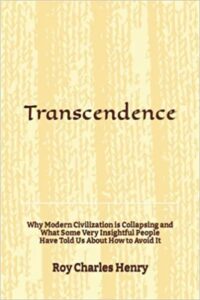Why Modern Civilization Is Collapsing and What Some Very
Insightful People Have Told Us About How to Avoid It
Table of Contents / Transcendence
Introduction
limits of something already known. The Simple Reality Project offers this book for just that reason, to present a path to greater consciousness, to go beyond our current delusional worldview, mistaken identity and resultant self-destructive behaviors.
In this book we answer these vital questions: What are we transcending? What are the limits beyond which we are trying to go? Why are we doing this? Our answers are not difficult or complicated. In fact, the purpose of Simple Reality is “to render service to the majesty of simple things” in the words of Harvey Dunn, an American artist in the early 19th century. We suggest it is time to rid ourselves of the “clutter” in our life, and instead embrace more silence, simplicity and solitude. In other words, make our whole life a meditation.
But first, a little American history. Writers and philosophers like Ralph Waldo Emerson, Henry David Thoreau, Margaret Fuller and Amos Bronson were central figures in Transcendentalism, an idealistic philosophical movement in New England around 1836.
Transcendentalism was short-lived in America but we detail it here because it is a starting point, meaning it is “something already known” and it is revered by many seekers of Truth. Following are the basic tenets of Transcendentalism:
- Everything is a reflection of God
- The physical world is a doorway to the spiritual world
- People can use intuition to experience god in nature and in their souls
- A person is their own best authority (Self-Reliance)
- Feeling and intuition are superior to reason and the intellect
- Spirituality should come from the self, not organized religion
- Insight and experience are more important than logic
The Transcendental movement taught that divinity pervades all of nature and humanity. Their beliefs related to religion resembled panentheism which holds that the divine intersects every part of the universe, extends beyond space and time, and that God is part of the universe as well as transcending it. This was off-putting for many at that time since it conflicted with both Jewish and Christian teachings.
We acknowledge the Transcendentalists and we unreservedly refer to their views here-and-there in our essays. But Simple Reality goes beyond Transcendentalism with more profound insights and answers to the structure of human consciousness.
The relative/reductionist worldview of the intellectual is the natural outcome of an intelligence created to solve the problems of living in the material world, and we live in a material world so it’s not difficult to understand why we revere them. But the intellect is not useful in the Transformation and Transcendence that we suggest in Simple Reality.
Many individuals have an ego-driven need to feel special or superior to the rest of Creation; but that doesn’t mean we are. In fact, we are part of a perfect whole (we are One!) and would be well advised to grasp that reality. Because we are not conscious of the more profound aspects of where we are (worldview) and who we are (identity), we have failed to create a sustainable community—we have forgotten why we are here (behavior). It is never too late for the naturally intelligent and compassionate human animal to evolve in a radically different direction. Afterall, we are totally supported by an omnipotent, omnipresent and omniscient Creative Intelligence.
Similar to Simple Reality, mythology challenges us to look at basic questions: Who am I? Where am I from? Why am I here? Where am I going? Mythologist Joseph Campbell devoted his life to research, writing and teaching about “the Hero’s Journey.” Studying the myths of many of the world’s cultures convinced him that each human being is on a kind of spiritual quest and that we are aided by “helpers.”
Simple Reality agrees with that premise and on our journey to Transcendence we are accompanied by insightful companions. Each essay includes an insight from a variety of “helpers” to aid in our paradigm shift and support the unfolding of our consciousness.
Our message isn’t new, pieces have been shared by many before, in countless other languages and cultures, but here we have a synthesis of their insights in one complete narrative.
The “helpers” we’ve chosen are ordinary and extraordinary, in the flesh and “disembodied,” from the past and in the here-and-now, walking among us and from beyond conventional norms of time and space. We are not disturbed by their divergent thinking, for their insightful wisdom sings in harmony with our own inner symphony.
Join us on this journey of Transcendence!
____________________
The day that you discover the sanctuary of the Divine within you is the day that your life settles down forever and that you’re ready for the magic of the true adventure.
John O’Donohue, Irish poet and philosopher



